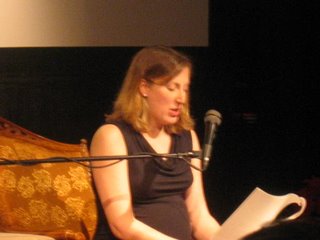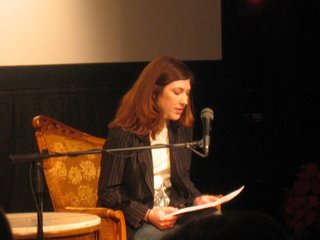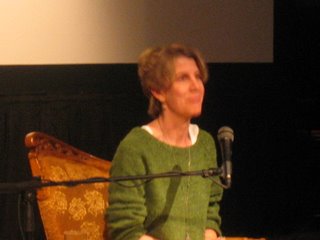Yesterday, I did pull myself together to head down to Columbia College Chicago and chat, alongside Ed Roberson, with Crystal Williams's poetry classes. The topic was ekphrasis, a poetic mode I've long been interested in, with an emphasis on Seismosis, and the discussion was fruitful. The student poets posed sharp questions, and when in a later discussion on poems by several well-known writers, they expressed special enthusiasm for a Claudia Rankine prose poem--on Mahalia Jackson, from Don't Let Me Be Lonely--I almost felt like dancing around the tables. Of course I knew that under Crystal's guidance they'd be a very good group, and they were. Ed was, as always, profound. In addition to reading one of his poems, he found apt and succinct ways to make unforgettable points, such as when ekphrasis began. He suggested--and I'm probably screwing it up somewhat--that it was when the poet saw and felt and entered the artist's hand (or eye, or sense of the camera's lens, etc.) as it began to move and act on the image, the idea, the concept from which the work being explored originated. A version of this, in more mystificatory form, flows through Seismosis. At any rate, I'm very excited because Ed'll be in residence next fall at the university, benefitting both the students and the rest of us, and I look forward to being able to hang out with him more often.
But back to the sluggishness: I do plan to write a few impressions on our brief but enjoyable trip; C's version, with photos, is here.
 The week before we traveled, a young scholar, Noura Wedell, delivered a presentation on Seismosis, among several other texts, at a conference, "Lyricisme et littérature," at the Centre d'études poétiques at the École nationale supérieure (ENS) Lyon. She was interested in several issues in particular, including genre, and the relation of the texts, as poems specifically, to the drawings; the politics of citation in the text, both obvious and more subtle (and the text is, specifically, a homage/hommage, to two important and little known figures, William White and Norman Pritchard, among others); and what sort of production the text "wills" itself to be, which is an open(-ended) question. I'd have loved to have been there, having only passed through Lyon with C. many years ago.
The week before we traveled, a young scholar, Noura Wedell, delivered a presentation on Seismosis, among several other texts, at a conference, "Lyricisme et littérature," at the Centre d'études poétiques at the École nationale supérieure (ENS) Lyon. She was interested in several issues in particular, including genre, and the relation of the texts, as poems specifically, to the drawings; the politics of citation in the text, both obvious and more subtle (and the text is, specifically, a homage/hommage, to two important and little known figures, William White and Norman Pritchard, among others); and what sort of production the text "wills" itself to be, which is an open(-ended) question. I'd have loved to have been there, having only passed through Lyon with C. many years ago. I saw that the Tuskegee Airmen were honored yesterday in Washington. On the one hand, I don't put much stock in official events like this, which are tend to be more about the spectacle and less about the substance, and yet given what these heroes and others like them had to endure, I had to ask yet again: why did it take so damned long? Their story is one I heard often growing up. Several of the airmen were native St. Louisans, and one, Wendell O. Pruitt (at right, receiving a handshake from fellow pilot John F. Briggs, photo from ALLSTAR Learning Laboratory's Blacks in Aviation page) who died in 1945, was a legend. (The infamous Pruitt-Igoe housing project was named in part after him, as is a relative of mine.) The Preznit managed to stumble over his words, as always, and Republican Congressional leader John Boehner (Ohio) couldn't pronounce "Tuskegee" correctly to save his life, but that didn't diminish either the ceremony or its significance. As one of the airmen I heard on NPR say, their resolve, courage and remarkable record was central to the integration of the Army and US military in general, and they appreciated the government's recognition, however belated.
I saw that the Tuskegee Airmen were honored yesterday in Washington. On the one hand, I don't put much stock in official events like this, which are tend to be more about the spectacle and less about the substance, and yet given what these heroes and others like them had to endure, I had to ask yet again: why did it take so damned long? Their story is one I heard often growing up. Several of the airmen were native St. Louisans, and one, Wendell O. Pruitt (at right, receiving a handshake from fellow pilot John F. Briggs, photo from ALLSTAR Learning Laboratory's Blacks in Aviation page) who died in 1945, was a legend. (The infamous Pruitt-Igoe housing project was named in part after him, as is a relative of mine.) The Preznit managed to stumble over his words, as always, and Republican Congressional leader John Boehner (Ohio) couldn't pronounce "Tuskegee" correctly to save his life, but that didn't diminish either the ceremony or its significance. As one of the airmen I heard on NPR say, their resolve, courage and remarkable record was central to the integration of the Army and US military in general, and they appreciated the government's recognition, however belated.Tonight I had the opportunity to see three of graduate students I've taught, Rosemary Harp, Andrea Uptmor, and Heather Dewar, read with author Tara Ison, a former Blattner Fellow and visiting professor at a university-sponsored reading at the Chopin Theater in Chicago. I'm posting photos from the event, and I have to say I was beaming with pride and delight all the way through, because I had such a great time working with all of them, and their work tonight was so polished and engaging. I also enjoyed hearing the excerpt from Tara's new racy new novel, The List, about a couple's break-up, and purchased a copy. Once I get around to reading it, I'll probably add it to the list of recommended books.

Heather Dewar

Rosemary Harp

Andrea Uptmor

Tara Ison (the photo is terribly blurred)






goboi (tiny voice) :-)
ReplyDeleteI'd never read McCarthy before The Road. No other book since, hmmm, Birdsong, has actually made me feel desperate on the characters' behalf, I was so drawn into the story. Until the last couple pages, I would have said that it was one of the very best, certainly most gripping, novels I'd ever read. And then those last two pages!!!! It was like watching a gymnast give a mind blowingly perfect performance on every event until the last, whereupon (s)he horrifyingly flubs everything. Did you read it?
ReplyDeleteKai in NYC
LOL to AG!
ReplyDeleteKai, I haven't read The Road yet. I've only read several of the earlier books, but my favorite by far is Blood Meridian, because of the sheer accomplishment of the narration, the language, and so forth. All the Pretty Horses and The Crossing, however, are also very fine novels, and Suttree is superb, but a big unshapely and perhaps too close to his own experiences to be as outstanding as the subsequent novels. I'll keep your critique in mind, however, when I do get to The Road, which was staring out at me and calling my name when I stopped by Three Lives Bookstores today....